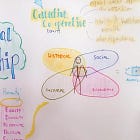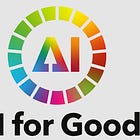Control
Have you ever wondered why every major institution seems to push the same messages? Why your bank, your kid's school, your government, and even your church all suddenly care about the same ‘global challenges’ and promote identical solutions?
It's not a coincidence. It's a system.
This is a more accessible version of ‘Triangles’.
Key Terms:
Models: Computer predictions from international organisations (IIASA, IPCC, WHO, World Bank) that set policy frameworks
Triangular Networks: Partnerships between three types of institutions that appear independent but coordinate on the same agenda
Chokepoints: Economic pressure points (banking, licensing, platforms) that enforce compliance without direct government control
The Pattern
Think about the last few years. When COVID hit, major institutions responded with remarkable coordination:
Your employer implemented similar health protocols
Your bank rolled out ESG-linked products, often including carbon-footprint tracking
Your kid's school taught similar pandemic lessons
Your government followed comparable expert guidance
Your local church promoted similar public health messaging
This wasn't organic agreement. It was institutional coordination operating through what Alice Bailey would have considered ‘triangular networks’ - partnerships between three types of organisations that appear independent but actually work together.
How the System Was Built
Between 1945 and 1999, three key figures laid the groundwork for this coordination:
Alice Bailey (1945) designed the basic template: networks operating through government, religion, and education to shape how people think about authority and collective responsibility.
Leonard Swidler (1995) provided the philosophical justification: since everything is ‘interdependent’, global coordination isn't just helpful — it's supposedly a law of nature. Individual autonomy becomes selfish and dangerous.
Hans Küng (1999) created the complete institutional map, calling on every major sector — religion, government, business, education, media, science, international organisations, and civil society — to adopt the same ‘global ethic’.
Together, they built a system where what looks like independent decision-making is actually coordinated implementation of the same agenda.
How It Works Today
The system operates through various triangular partnerships, but three in particular matter:
Triangle 1: Government–Business–NGOs
This is the ‘stakeholder capitalism’ model you hear about constantly.
How it works: Governments set regulations, businesses comply to access markets, and NGOs provide moral legitimacy by advocating for the same policies. All three use identical metrics (ESG scores, sustainability indicators, diversity benchmarks) to measure ‘success’.
Real example: Climate policy isn't debated democratically. Models from international organisations set ‘carbon budgets’, businesses adopt ESG reporting to access capital, governments implement policies to meet the targets, and environmental NGOs demand even faster action. The circle is complete.
Triangle 2: Government–Religion–Education
Bailey’s ‘triangle’ shapes how people think about authority and moral responsibility.
How it works: Schools teach that questioning expert consensus is dangerous ‘misinformation’. Religious leaders frame compliance with global initiatives as moral duty. Governments provide the legal framework for emergency powers that bypass normal democratic processes.
Real example: During COVID, this triangle coordinated effectively. Schools taught pandemic compliance as civic virtue, religious leaders condemned gatherings as selfish, and governments implemented lockdowns as moral necessities. Anyone questioning this coordination was typically labelled anti-science or uncaring.
Triangle 3: Government–Science–Media
This controls what counts as ‘expert consensus’ and how it's communicated.
How it works: Government agencies fund research that supports predetermined policy directions. Scientists who want funding align their work with those priorities. Media amplifies the resulting ‘consensus’ while marginalising dissenting voices as fringe or dangerous.
Real example: Climate science funding flows to research that supports dramatic policy interventions. Media coverage presents this as settled science. Government policies cite the resulting consensus as justification. Independent scientists questioning the models face career consequences.
Here's the most important thing to understand: these triangular networks ultimately derive their authority from computer models that few people can examine or challenge. This represents a fundamental shift in how power operates.
In 1986, UNESCO's Venice Declaration said the old mechanistic science was no longer adequate and urged science to integrate with ethics and culture. That shift licensed models to set moral direction: predictions → imperatives → governance.
Models Create Reality
International organisations produce complex computer models predicting future scenarios — climate catastrophe, pandemic spread, economic collapse. These models become the foundation of policy, but they're essentially black boxes that most policymakers and citizens cannot examine.Models Become Moral Law
Model predictions get translated into moral imperatives. If a climate model predicts warming, reducing emissions becomes a moral duty. If an epidemiological model (like Imperial College's 2020 projections) predicts disease spread, lockdowns become ethical necessities.Questioning Models Becomes Immoral
Once models are established as moral authorities, challenging them becomes not just scientifically incorrect but ethically wrong. This is why questioning climate models gets labelled ‘denial’ rather than scientific skepticism.Democratic Processes Become Obstacles
Since models have determined what's moral and necessary, democratic debate becomes an impediment to implementing obviously correct policies. Public input gets reduced to deciding how to implement what models have already determined must happen.
This system concentrates enormous power in whoever controls the models, while shielding them from accountability. If climate policies destroy your local economy, that's not the fault of the policymakers — they were just following the science. If pandemic lockdowns harm children's development, that's not the fault of public health officials — they were just implementing what the models required.
The models become perfect shields for exercising power without responsibility. Politicians can claim they're just following expert guidance. Bureaucrats can claim they're just implementing scientific requirements. International organisations can claim they're just providing technical assistance. Everyone points to the models, but the models themselves — and the people who create and control them — remain largely invisible and unaccountable.
This is why the Venice Declaration was so crucial. By legitimising science as the source rather than servant of ethics, it created a new form of authority that operates outside democratic accountability. The people who control the models now effectively control the moral framework of civilisation, but they do so invisibly, through technical expertise that feels objective even when it's deeply political.
Consider how this works in practice: Climate models generate carbon budgets that supposedly represent physical limits on emissions. These get translated into moral imperatives about our duty to future generations. International climate agreements then implement these imperatives through binding commitments that national governments must meet regardless of what their citizens want. If your community suffers from resulting energy restrictions or economic disruptions, that's not a policy choice that can be democratically reversed — it's a scientific necessity that must be accepted.
The genius of this system is that it makes resistance feel not just difficult but irrational and immoral. Who can argue with science? Who can oppose saving the planet? Who can question expert consensus during a health emergency? The answer is: anyone concerned with democratic accountability and human freedom. But the system makes such concerns seem selfish, ignorant, or evil.
The Enforcement Mechanism
This isn't just coordination — it's control through economic pressure. The system doesn't need to convince you it's right; it just needs to make resistance too expensive to sustain.
How Professional Control Works
The most revealing examples came during COVID, when ‘ethics violations’ became a common weapon against dissent. Healthcare workers who questioned lockdown policies or vaccine requirements often faced professional sanctions — doctors who prescribed treatments not approved by health authorities risked losing licenses, while nurses who refused vaccines were frequently fired for ‘ethics violations’. Teachers and professors who questioned school closures faced similar professional consequences, terminated for failing to uphold ‘community values’ derived from the same models. Scientists who published studies questioning lockdown effectiveness found their papers retracted and funding pulled in many cases. But those ‘ethics’ weren't derived from medical evidence — they flowed directly from epidemiological models like Imperial College's 2020 projections that vastly overestimated disease spread and mortality.
The Economic Chokepoints
The enforcement operates through a web of economic pressure that touches most aspects of modern life. Your bank becomes a primary control point, with many major institutions now denying loans to businesses that don't meet ESG standards or closing accounts for organisations labelled as spreading ‘misinformation’. When Canadian truckers protested vaccine mandates (2022), their crowdfunding accounts were frozen. When restaurants stayed open during lockdowns, business loans were often called in. Banks increasingly use ‘de-risking’ policies that systematically cut off disfavored sectors and activities.
Government control operates more subtly but often just as effectively. Business licenses frequently require compliance with global sustainability frameworks. Professional credentials commonly demand adherence to ‘community standards’ that align with international guidelines. Research funding typically supports predetermined policy directions. During emergencies, these requirements can be imposed rapidly through powers that bypass normal regulatory processes.
Professional and academic bodies provide the intellectual enforcement layer. Medical boards, bar associations, and academic institutions increasingly enforce ethical codes that align with international consensus. Question the approved narrative, and you're often labelled guilty of ‘conduct unbecoming’. Career advancement frequently requires continuing education that reinforces approved thinking and demonstration of ‘inclusive leadership’ aligned with global frameworks.
Technology platforms complete the information control circuit. They moderate content based on ‘expert consensus’ from international health organisations that often created the original policies. Dissenting voices routinely get shadow-banned or demonetised, while fact-checkers whose standards derive from the same expert networks police acceptable discourse. AI systems now automatically detect and suppress ‘harmful’ content, creating real-time enforcement of official narratives.
Even many workplaces become enforcement nodes. Corporate policies based on international sustainability standards determine daily work environments. Social media posts that contradict company ‘values’ can cost jobs. Diversity training promotes global citizenship frameworks as moral necessities.
The COVID Case Study
During the pandemic, this enforcement architecture activated simultaneously across all sectors:
Medical professionals who prescribed ivermectin or hydroxychloroquine faced license suspension — not because these treatments were proven harmful, but because they contradicted WHO guidance derived from models showing these drugs were unnecessary for a disease requiring only vaccines and non-pharmaceutical interventions.
Business owners who kept restaurants or gyms open faced immediate license revocation and bank account freezes. The ‘ethics’ justifying this enforcement came directly from epidemiological models showing that any social interaction would cause exponential spread and mass death.
Religious leaders who held services faced criminal charges for ‘reckless endangerment’. The moral framework making this seem reasonable flowed from the same models that treated every gathering as a potential super-spreader event.
Parents who resisted school mask mandates or remote learning faced child protective services investigations for ‘medical neglect’. The ethical standard making this intervention seem necessary derived from models showing children were both highly vulnerable and dangerous vectors of transmission.
Researchers who published studies showing lockdowns caused more harm than benefit found their work retracted from journals whose editorial policies were guided by public health officials implementing model-derived policies.
The pattern was always the same: computer models generated predictions, international health authorities translated these into moral imperatives, professional bodies enforced compliance through ‘ethics’ policies, and economic sanctions punished resistance.
Why This Works
This enforcement system is particularly effective because it operates through layers of apparent legitimacy while removing democratic accountability at every level.
It's indirect: You're not punished for your beliefs, but for ‘ethics violations’ that just happen to align perfectly with those beliefs. A doctor questioning vaccine mandates isn't fired for political dissent — they're terminated for violating professional medical ethics. A farmer resisting carbon restrictions isn't prosecuted for environmental crimes — they're sanctioned for failing to meet sustainability standards. The punishment feels legitimate because it comes through established professional channels.
It's decentralised: No single authority gives the order. Professional bodies, banks, platforms, and employers all independently choose to enforce the same standards. This makes resistance feel futile — even if you could convince one institution to change course, dozens of others would continue the pressure. It also provides plausible deniability — each organisation can claim they're just following standard practice.
It's self-reinforcing: Each organisation that falls in line creates pressure on others to conform. When major banks adopt ESG lending standards, smaller banks must follow or lose access to correspondent banking relationships. When universities require climate curriculum, faculty must comply or lose tenure eligibility. When tech platforms ban ‘misinformation’, other platforms adopt similar policies to avoid regulatory scrutiny. Resistance becomes increasingly isolated and expensive.
It feels legitimate: The enforcement comes through established institutions using established procedures. Professional licensing boards, bank compliance departments, and university review committees all have long histories of regulating behaviour. It doesn't look like authoritarianism because it operates through the same mechanisms used for legitimate professional standards — the difference is that the standards themselves now derive from international frameworks rather than local democratic processes.
It's comprehensive: Unlike traditional censorship or persecution, this system can cut you off from your career, your bank account, your platform, and your professional credentials simultaneously. Resist one aspect, and you find yourself excluded from multiple systems that modern life requires.
The climate policy framework provides perhaps the clearest example of how this system operates in practice. International climate models generate ‘carbon budgets’ that supposedly represent physical limits on emissions. These budgets get translated into national policies through international agreements that often bypass normal legislative processes.
Consider what's being implemented in various jurisdictions: personal carbon tracking through banking transactions, travel restrictions based on individual carbon footprints, property restrictions based on climate risk assessments, and professional requirements for climate education. You could face concrete penalties — higher insurance rates, restricted travel, limited access to certain jobs or housing — for failing to comply with carbon limitations you had no role in establishing.
Your bank might refuse to finance your home purchase because the property doesn't meet climate resilience standards derived from international frameworks. Your employer could require climate training that treats questioning of climate policies as professional incompetence. Your city could restrict vehicle use based on carbon budgets set by global organisations. Your home insurance could be cancelled because last summer was hotter than average, and your area was deemed a potential risk.
What makes this particularly effective is that it often bypasses normal democratic accountability. You can vote for representatives who promise to resist climate restrictions, but policies frequently get implemented through administrative rules, professional standards, and private business decisions that elected officials don't directly control.
The system creates what feels like voluntary compliance — you're technically free to reject carbon tracking or refuse climate education — but exercising that freedom becomes prohibitively expensive. This preserves the illusion of choice while eliminating meaningful alternatives. You remain ‘free’ in the same way you're free to refuse a job that requires professional licensing: technically possible, practically ruinous.
Step out of line, and you don't just lose one thing — you lose access to the entire system of modern life.
How They Select Tomorrow's Decision-Makers
The system doesn't just control current institutions—it carefully selects and trains the people who will run them in the future. This happens through what looks like prestigious leadership development, but actually functions as ideological screening and alignment.
The Selection Process
Think about the most influential leadership programs you've heard of:
World Economic Forum Young Global Leaders: Future political and business leaders shaped by stakeholder capitalism frameworks. Klaus Schwab famously boasted that the WEF has penetrated governments through graduates like Justin Trudeau, Emmanuel Macron, and many others.
Rhodes Scholars: Academic elites trained in global governance perspectives at Oxford, creating lifelong networks committed to international coordination over national sovereignty.
Aspen Institute Programs: Cross-sector leadership development in ‘shared values’ that just happen to align with global frameworks.
UNESCO Educational Fellowships: Educational leaders aligned with global citizenship rather than local community values.
Interfaith Climate Initiatives: Religious authorities coordinated through sustainability programs that subordinate traditional faith teachings to environmental activism.
The Genius of the System
These programs appear to select the ‘best and brightest’, but they actually select for compliance with predetermined worldviews. Participants think they're being chosen for their talent, when they're really being chosen for their willingness to accept global coordination as inevitable and necessary.
The process works because it feels like an honor. Who wouldn't want to be selected as a ‘Young Global Leader’ or awarded a Rhodes Scholarship? But acceptance requires demonstrating alignment with the sponsoring organisation's values — values that consistently prioritise global governance over local democracy.
The Closed Loop
Over time, only people who've been through these initiation processes reach positions where they could actually challenge the system. A mayor might resist global frameworks, but they rarely advance to state or national office without demonstrating ‘leadership’ credentials from these same programs.
The result is what looks like diverse leadership — people from different countries, backgrounds, and political parties — but who all share the same fundamental assumptions about the need for expert-managed global coordination. They genuinely believe they're making independent decisions, unaware that their entire worldview was shaped by carefully designed selection and training processes.
How Everything Got Backwards
Perhaps the most crucial insight is recognising how the entire process of democratic governance has been inverted. What should be bottom-up has become top-down, while maintaining the appearance of democratic participation.
How Democracy Should Work:
Public Values: Citizens express their priorities through democratic processes
Ethical Frameworks: Representatives translate these values into policy principles
Technical Implementation: Experts figure out how to implement what the public wants
How It Actually Works Now:
Elite Models: International organisations create computer predictions that supposedly show what's necessary
Elite Ethics: Expert networks translate these models into moral imperatives that must be followed
Elite Governance: Politicians implement predetermined frameworks while claiming democratic mandate
The Illusion of Participation
The system preserves democratic forms while eliminating democratic substance. You still vote, but your representatives increasingly implement policies derived from international agreements they didn't negotiate, based on models they can't examine, enforced through financial mechanisms they don't control.
Public input gets reduced to deciding how to implement what the models have already determined must happen. Town halls become exercises in explaining why predetermined policies are necessary, not forums for genuinely considering alternatives.
A Concrete Example
Consider climate policy: Instead of communities democratically deciding how to balance environmental concerns with economic needs, carbon budgets derived from international climate models become moral imperatives that must be met regardless of local preferences. Your city council doesn't debate whether to pursue carbon neutrality — they debate how fast to implement the targets that international agreements have already established.
The appearance remains democratic (elected officials making policy), but the substance has become technocratic (experts determining what policies are morally required). Citizens vote for representatives who then claim they have no choice but to follow ‘the science’.
When Machines Enforce Expert Consensus
The final stage of this system involves automating expert consensus enforcement through artificial intelligence. This isn't science fiction — it's happening right now, and it represents the ultimate removal of human agency from governance decisions.
Real-Time Consensus Enforcement
AI systems already moderate content based on ‘expert consensus’ from the same international health organisations that created pandemic policies. When the WHO updates its guidance, fact-checking algorithms immediately begin suppressing content that contradicts the new position — without any human review or democratic input.
This creates instant, global implementation of expert consensus. No more waiting for legislative processes or public debate. When international bodies update their positions, AI systems can enforce compliance across platforms, banks, and institutions simultaneously.
The Banking and Credit Example
Your bank's lending algorithms increasingly incorporate ESG scores that automatically deny credit to businesses that don't meet sustainability criteria derived from international frameworks. The bank doesn't make a conscious decision to refuse your loan — the AI system simply calculates that your business doesn't align with expert-defined environmental standards.
Similarly, insurance algorithms can automatically increase premiums for properties that don't meet climate resilience standards, or for individuals whose digital footprints suggest non-compliance with health guidelines.
Professional and Educational Automation
AI systems increasingly screen job applications for ‘values alignment’, filtering out candidates whose social media activity suggests questioning of expert consensus. Professional continuing education requirements get automatically updated to reflect the latest international guidelines, with AI systems tracking compliance.
Educational platforms use AI to personalise curricula, ensuring students receive information that reinforces rather than challenges approved frameworks. The AI doesn't consciously propagandise — it simply optimises for learning outcomes defined by international educational standards.
The Ultimate Control
The genius of AI enforcement is that it feels automatic and objective rather than political. No human makes the decision to suppress your content, deny your loan, or reject your job application. The AI is just following its programming to optimise for expert-defined criteria.
But those criteria were set by the same international networks that control the models and frameworks. The result is a system where expert consensus gets enforced instantly and automatically, without the messy delays of democratic processes or the possibility of local resistance.
Why This Matters Now
Once AI systems fully automate expert consensus enforcement, resistance becomes exponentially harder. Instead of convincing your bank manager or challenging your local school board, you'd need to somehow change the algorithms that enforce compliance across all institutions simultaneously.
The window for maintaining human agency in these decisions is closing rapidly. Each day, more decisions get delegated to AI systems programmed to enforce the same global frameworks, making the entire architecture increasingly immune to democratic pressure.
Why This Matters and What's at Stake
This system has effectively replaced democratic decision-making with expert management. Your elected representatives aren't really governing — they're often implementing predetermined frameworks created by international organisations, justified by computer models, and enforced through financial pressure.
When politicians like Liz Truss try to pursue policies their voters actually want, the system can remove them. When scientists question official narratives, they frequently lose funding. When businesses resist ESG requirements, they often lose access to capital.
What looks like democracy is actually technocracy wearing a democratic mask.
We're at a crossroads. This coordination system is nearly complete, and it's increasingly being automated through AI systems that can enforce expert consensus in real-time. Once that process matures, resistance becomes exponentially harder.
The system creates what feels like voluntary compliance — you're technically free to reject carbon tracking or refuse climate education — but exercising that freedom becomes prohibitively expensive. This preserves the illusion of choice while eliminating meaningful alternatives. You remain ‘free’ in the same way you're free to refuse a job that requires professional licensing: technically possible, practically ruinous.
The window for maintaining genuine democratic choice is closing rapidly.
What You Can Do
The system depends on your compliance and silence. Here's how to resist:
Build parallel systems: Support local businesses, schools, and organisations that operate independently of global frameworks. Use cash whenever possible — it leaves no digital trail for tracking your purchases, carbon footprint, or consumption patterns. While digital payments create permanent records that can be analysed and scored, cash transactions remain private and preserve your autonomy. Choose platforms and services that don't track and score your behaviour.
Question the metrics: When organisations talk about ESG scores, sustainability targets, or global standards, ask who set these metrics and why. Demand local control over local decisions.
Hold politicians accountable: Start at the local level where you can actually access your representatives. Attend city council meetings, county commissioner sessions, and school board hearings. Ask direct questions about international frameworks and global standards. Push back when local officials implement policies driven by external organisations rather than community needs. Local politicians are often more responsive because they live in your community and face you directly. Use this leverage to demand transparency about where policies actually originate.
Connect with your community: Build real relationships with neighbors. Attend local government meetings. Support politicians who resist international pressure in favor of local accountability.
Preserve independent thinking: Read diverse sources. Question expert consensus. Maintain relationships with people who think differently. Don't let social pressure silence your doubts.
Use your economic power: Support businesses that resist ESG requirements. Bank with local institutions when possible. Avoid products and services that track and score your behaviour.
The Choice
The triangular networks work by making resistance feel impossible and coordination feel inevitable. But they're not laws of nature — they're human systems that depend on human compliance.
Every time you choose independence over convenience, local community over global citizenship, and genuine democracy over expert management, you're weakening their hold.
The basic principle remains what Americans once fought for: no power without accountability. The colonists didn't just object to British taxes — they objected to being governed by people they couldn't vote out. Today we face the same problem on a global scale. The models that determine your economic future, the international bodies that set environmental rules affecting your community, the expert networks that define professional standards in your field — you can't vote any of them out of office. They shape your life but answer to no one you can reach.
Your vote might influence your congressman, but it doesn't touch the OECD economists setting global indicators, the WHO officials defining health policies, or the climate modellers whose projections become binding international commitments.
The power is real, but the accountability has vanished.



















This is ghoulishly clever. It took considerable imagination to even conceive of the design of the control system, let alone to begin to implement it.
The point about self maintaining structures through selection of leaders who can be relied upon to follow instructions. Personally, I feel sure that there is at least one other layer of control that isn’t described here.
Consider those who at some point realized that what was happening was tyrannical. Didn’t say anything while working.
But in actual or in semi-retirement, they could, like me, speak freely with only minor economic consequences (I was fired by my remaining consulting clients, biotechnology companies, presumably because I was judged to be a conspiracy theorist and therefore an unsuitable person to be advising the board or the CEO).
But look around. Can you find a single example of a recently retired, C-suite professional who is speaking out?
I don’t think there’s even a single example from any business sector, educational institutions or branch of public life.
ESC’s document here, which as a former executive, I would classify as a superbly written executive summary plus, provides examples of how those involved, or merely deeply aware, are effectively restrained from objecting, while working.
I do know that, even in retirement, many people are retained in various ways, such as an Emeritus professorship or a board consultancy, which pays generously yet requires little. In such circumstances, the threats may hold continuing leverage.
However, not everyone at senior level is paid into retirement and in any case, such monies are never life changing. Yet nobody speaks out.
I rather suspect that there’s another control mechanism. I’ve heard enough snippets to cautiously hypothesise that “kompromat” is required on senior staff, more senior than I ever reached (because never was it suggested to me that further elevation was available, subject to certain conditions being met). I wouldn’t be at all surprised if Epstein’s island or related activities didn’t play some role in this respect.
Yes. Hence the mantra we should all be repeating : Models are weapons of mass destruction!